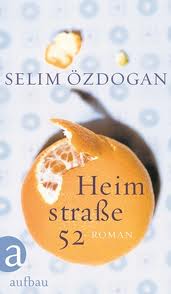Selim Özdogan is the chronicler of the Turkish guest worker (Gastarbeiter) experience in Germany and his latest novel, Heimstraße 52, is a sequel to his 2007 novel DIe Tochter des Schmieds (see my review here). The novel covers 20 years beginning in the 1960s, the time of the earliest wave of workers from Turkey.
Heimstraße 52 picks up where Die Tochter des Schmieds ended. We last glimpsed Gül, the central figure of Tochter, as she was changing trains in Istanbul on her way to join her husband Fuat in Bremen. In Heimstraße Gül arrives not knowing a word of German, and never having been outside of her provincial city in Anatolia. And she arrives in Germany without her two daughters – Ceyda and Ceren – who stay behind in Turkey with her beloved father, the blacksmith Timur.
Adjustment to life in Germany is – as one might imagine – difficult and Gül is sick with longing for her daughters. But she is an excellent worker, and over time Gül and Fuat make enough of an income so that they can move into a larger apartment and bring Ceyda and Ceren to Germany. Even then, however, Gül longs for her father and her life in Anatolia – she lives for the summer vacations when they can spend a few weeks back home.
Gül finds some measure of solace in the close relationships she develops with the other Turkish immigrant women. Özdogan draws vivid portraits of strong, long-suffering women who do whatever it takes to keep their families together. The men, for the most part, are reckless louts, who throw away money on lottery tickets and booze. A good marriage is one where the husband doesn't beat his wife. Gül's husband Fuat is no exception, but he is a huge admirer of German discipline and order – which he contrasts to the corruption and chaos of his homeland. He is constantly dreaming up schemes to "beat the system" HIs favorite expression is "Gewieft muss man sein" (You have to have steet smarts.).
What's missing in Heimstraße is a broader depiction of the immigrants in German society. Hardly any Germans appear in the novel; the few that do appear are sympathetically drawn. We never see Fuat working at the Mercedes plant, interacting with his bosses. Why does Gül feel so isolated? The 1960s was a period of tremendous upheaval in Germany, as in all of Europe and US. But none of that ever seeps into the novel. Instead, the passage of time is noted by the new electronic gadgets Fuat accumulates and better telephone connections to Turkey.
Heimstraße lacks the timeless quality that made Die Tochter des Schmieds such a pleasure to read. The overall impression is one of disjointedness, with abrupt shifts back and forth between Germany and Turkey. But disjointedness may be Özdogan's narrative strategy after all. The German experience changes Gül, so that she feels like a stranger in her own native country when she goes home to be with her father. You cannot go home again, seems to be the message. At one point, the narrator intrudes to comment on this strange feeling of being in between two worlds:
Als sei dieses Land ein Magnet, ein Magnet, der auch dann noch Kraft besitzt, wenn der Ruf des Geldes längst verklungen ist und die Unmutsäusserungen der Deutschen kaum mehr zu überhoeren sind. Als sei das Land eine Droge, von der man nich mer loskommt. Oder ein Fluch, der auf einem lastet. Oder ein Versprechen, das man nicht vergessen mag. Oder eine Bequemlichkeit, die man nicht mehr missen moechte. Vielleicht auch eine Heimat, deren Ruhe und Ordnung man schätzt, obwohl man sich gleichzeitig nach Überschwang und warmem Chaos sehnt.
(As though this country were a magnet, a magnet which still has power long after the call for money has subsided and the critical comments by the Germans can't be avoided. As though this country were a drug that you can't do without. Or a curse that weighs heavily on you. Or a promise that you can't forget. Or a convenience, that you'd miss if it weren't there. Maybe also a home, whose order and quiet you value, even as you long for the excess and warm chaos. )
Heimstrasse ends just as Die Tochter des Schmieds, with Gül embarking on a journey from her homeland – older, wiser and sadder. I look forward to the next – and undoubtedly final – installment of her story.


